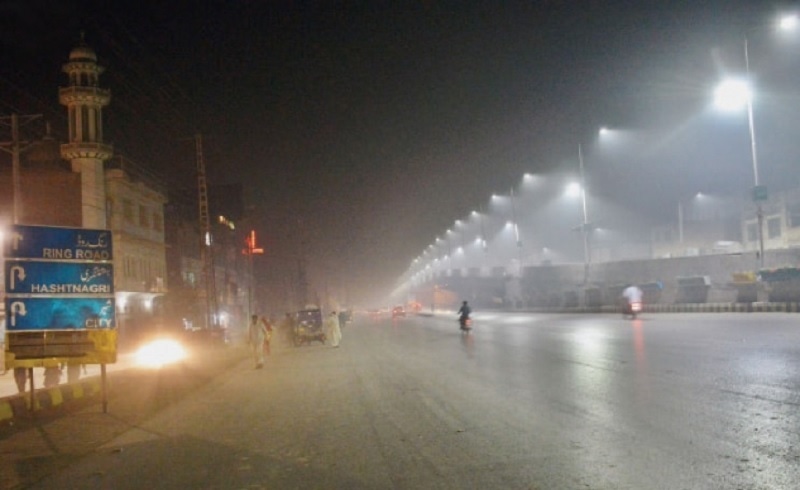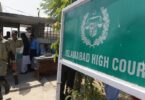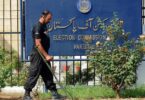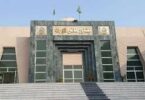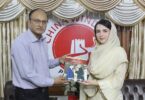Ishaq Khan
PESHAWAR: The historical Peshawar city was once known as’ ‘City of Flowers” but now the city with the population of more than 2 million, the Peshawarites are breathing the unhealthy polluted air in the capital city of Khyber Pakhtunkhwa.
Hameed Khan, 64 a retired government officer, said that it is becoming difficult to travel in the city as with every passing day the pollution is increasing and causing problems for those who are already struggling with different sicknesses.
Khan said that he is a heart patient and the doctor advised him to take a regular walk to maintain his health; however the recent increase in pollution in Peshawar is affecting more than benefitting.
According to the World Health Organization (WHO), over 6000 cities in 117 countries are now monitoring air quality and almost the entire global population (99%) breathes air that exceeds WHO air quality limits. The people living in these cities are still breathing unhealthy levels of fine particulate matter and nitrogen dioxide.
WHO claimed that air pollution kills around 7 million people in the world every year and adding 9 in 10 people breathe air containing high levels of unhealthy particulates.
The UN health agency report further revealed that breathing fine particulate matter known as PM2·5 can worsen the chronic lung diseases, lead to higher rates of breast cancer, cause earlier onset of neurological diseases like Alzheimer’s and Parkinson’s and increase heart attacks and stroke.
Air pollution is taking 22000 lives of Pakistanis every year and causing health issues to thousands others in different parts of the country.
Dr Muhammad Nafees, Head of the Department of Environment at University of Peshawar, said that air pollution is the most dangerous form of pollution because we cannot limit the air to certain areas or individuals as everyone needs air and it can move freely everywhere.
Nafees claimed that the air pollution has reduced 2 to 3 years of age of Pakistanis because of its hazardous nature to human health.
He added that in 2018 the Pakistan Air Quality Initiative declared Peshawar as the fifth most populated city which is a clear sign that the pollution are on the rise in the provincial capital.
While answering to a question regarding the major causes of pollution, Nafees said several reasons are responsible for air pollution including industrialization, brick factories, others but the traffic contributes more than 50% to pollution in this historical city.
He explained that the traffic-related air pollution (TRAP) is a mixture of gases and particles that include many different chemicals such as Nitrogen dioxide (NO2), Particulate matter (PM), Black carbon (BC), Ultrafine particles (UFP), Carbon monoxide (CO), Benzene and other volatile organic compounds (VOCs), Polycyclic aromatic hydrocarbons (PAHs) from cars, buses and trucks. TRAP includes emissions from exhaust, evaporation of fuel, and tire and brake wear.
Nafees advised that the government needs to create and open the link roads in the city that will also help to manage the traffic flow because congestion increases travel costs and reduces accessibility by increasing travel times and congestion can also cause substantial adverse effects, such as an increase in noise pollution, driver stress, decreased mental satisfaction and also on economic growth of any city.
Jan Said, 55 years old rikhshaw driver told The Frontier Post that he is consuming around eight litres of petrol every day and is aware that the condition of the rikhshaw is one of the reasons for air pollution.
“I don’t have any other option to earn the daily bread for my children, if the government or any other organization provides us any alternative then who wants to drive this old rikhshaw”, he said.
Muhammad Irshad, Chief Analyst and Deputy Director of Environmental Protection Agency (EPA) Laboratory, confirmed that the city’s traffic is the main contributor to Peshawar’s air pollution, adding if we can manage the traffic flow in the right way then maximum problems of pollution can be solved in the provincial capital.
The study showed emissions from the transport sector are responsible for contributing 58.6 percent in Peshawar air pollution following the industry, waste burning, dust, brick factories and others, he informed.
EPA’s Chief Analyst explained that there are five major air pollutants including Particulate matter (PM2.5), Ozone (O3), Nitrogen dioxide (NO2), Carbon monoxide (CO) and Sulphur dioxide (SO2), however in the recent days PM2.5 value is the major component of worry in Peshawar’s air as its existence in air crosses the dangerous level, exceeding 6 to 8 times standard set by the EPA, it is a non-filterable matter.
“The short-term standard (24-hour or daily average) is 35 micrograms per cubic meter of air (µg/m3) however in Peshawar it reached the 220 levels in some parts of Peshawar which is very high”, Irshad said.
Answering to question regarding the EPA role in controlling the air pollution, Irshad said we are continuously doing inspection of industries, brick factories, crush machines and other sources of pollution in city and if they were not following the required standard of EPA then they have to face fine in the form of penalty and in some cases we sealed the factories for ignoring the standard, however to maintain the check and balance on traffic in this regard is not in our mandate.
While contacting the Transport Department, Manager Vehicular Emission Testing Station (VETS), Pir Zubair informed that four teams of VETS are checking the vehicles with the assistance of traffic police in different parts of the provincial capital and fined those who are not been able to qualify at the required National Environmental Quality Standard (NEQS).
Zubair shared the figures that around 79,074 vehicles were checked during 1 July 2022 to 28 February 2023 and found 20,796 vehicles failed to meet the required NEQS.
He shared that around 0.9 million vehicles including 43,000 commercial vehicles mostly on diesel, more than 10,0000 motorcycles, 35,000 registered rickshaws and the unregistered numbers of rickshaws are doubled in numbers, roaming in the city, which are the main source of pollution in Peshawar.

